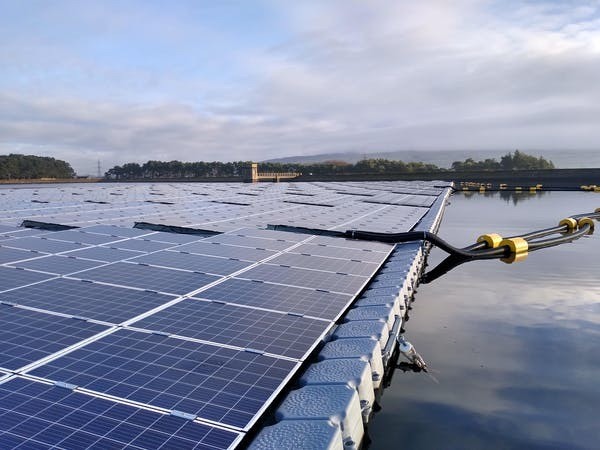Floating solar energy
Courtesy : www.nrdc.org/
India’s largest floating solar power project is expected to be commissioned in May 2021 in Telangana. Several other states, Karnataka, Madhya Pradesh, Tamil Nadu, and West Bengal recently are also developing floating solar projects. Floating solar photovoltaic is a new business opportunity to meet India’s renewable energy targets and create jobs, as analyzed in a new case study.

Floating Solar
Floating solar photovoltaic is an emerging segment in which solar photovoltaic (PV) modules are installed (floated) on a water body. Asia leads in global floating solar photovoltaic (FPV) deployment. Floating solar accounts for 2.6 gigawatts (GW) of installed capacity in August 2020 and it is expected to grow 20% annually to 2025.

India is a leader in clean energy—the country aims to install 175 GW of renewable energy by 2022 and 450 GW by 2030. Interest in FPV is growing in India with several water bodies across the country. FPV taps the country’s large water reservoirs to overcome some of the persisting issues of ground-mounted solar, such as the lack of levelled land, evacuation infrastructure and performance degradation due to high operating temperatures. India could potentially build 280 GW of FPV capacity by utilizing about 30% (nearly 1,800 kms2) of its medium and large water reservoirs.
India had about 2.7 MW of installed FPV capacity by the middle of 2019, and projects with a combined capacity of 1.5 GW capacity are under development. The Indian government has set a target to achieve 10 GW of FPV capacity by 2022. Investment costs and bid prices for FPV tenders have also been rapidly declining. As a result, India achieved the lowest cost for FPV projects at ₹35 ($0.5)/watt during the bid for 70 MW FPV capacity in Kerala.
Floating Solar and Jobs
A new case study, Employment Potential of Emerging Renewable Energy Technologies – Insights from the Floating Solar Sector, examines the direct employment potential across the floating solar project development cycle and captures the sector’s skill development needs. Estimates are drawn from project-based surveys and interviews with manufacturers, developers, and engineering, procurement, and construction (EPC) providers. The study provides insight into the operational strategies and team structure, in addition to discussing the typical duration of different phases of project development and the corresponding workforce employed. The case study is developed by the Council on Energy, Environment, and Water (CEEW) and Skill Council for Green Jobs (SCGJ) along with NRDC.

Key Findings
- A small-scale FPV plant (capacity <1 MW) directly employs 58 workers while a mid-scale (capacity <10 MW) plant employs 45 personnel, over the course of their deployment.
- FPV generates indirect job opportunities through manufacturers of specialized components like floats, anchors, and mooring system as well as domestic module manufacturers.
- FPV offers opportunities for people qualified in hydraulic engineering, marine architecture, and plastic blow-molding techniques in addition to those required in ground- mounted solar operations.
- By setting time-based targets for FPV capacity, the Indian government can widen the employment potential of this sector, bolster efforts to drive the COVID-19 economic recovery and achieve its Paris Agreement climate goals.
Number of jobs in deploying a floating solar photovoltaic plant of different capacities (Source: CEEW-NRDC analysis)

** The number of permanent employees overseeing these activities. In addition, temporary staff is also sourced during each maintenance cycle, who carry out the maintenance activities like module cleaning.
Key Recommendations
- The Ministry of New and Renewable Energy (MNRE) should specify standards for PV modules used in the FPV sector.
- The Ministry of Skill Development and Entrepreneurship should develop training programs on specialized skills relevant to the FPV industry such as marine architecture and hydraulic engineering.
- The FPV industry should regularly release data on employment and skill development needs in the sector.
- MNRE should announce periodic targets for FPV capacity.
- The Solar Energy Corporation of India (SECI) should initiate hydropower-linked FPV project tenders.

With over 92GW of installed renewable energy capacity, India has made remarkable progress toward meeting its climate goals. Floating solar photovoltaic offers a new pathway for the country to realize its clean energy ambitions and create jobs. Floating solar helps tap into India’s large water reservoirs and overcome some of the persisting issues facing ground-mounted solar. FPV can generate additional employment opportunities in domestic manufacturing, research, and product design. New employment opportunities, especially in research and product design, beckon when FPV scales up in the country.




